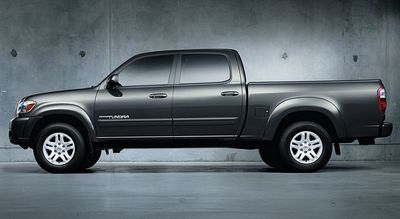.
Toyota Tundra Review: Difference between revisions
No edit summary |
(No difference)
|
Revision as of 13:50, 14 September 2006
The Toyota Tundra was introduced in 2000 as Toyota's full-size pickup. With each subsequent year, Toyota has improved upon it, eventually earning it recognition as a top-notch competitor in its class. The most recent update was in 2005, when it received some cosmetic touch ups and more powerful engines. It remained basically unchanged for the 2006 model year, but a redesign is expected for 2007.
See also the main fact sheets for the Toyota Tundra.
High Points
Low Points
Performance and Handling
Gas Mileage
Of 13 rated full-size trucks on Autos.com, the most fuel efficient Toyota Tundra ranked 6th overall. This, of course, does not reflect the various trims of the truck, which all have varying statistics. The city/highway mileage for each of these, as reported by FuelEconomy.gov, are as follows:
Safety
The NHTSA performed safety tests on all three styles of the Tundra, with the exception of the double cab, on which side impact results were not available. In these tests, all received 4/5 stars for front driver impact, 5/5 stars for front passenger impact, and 3/5 stars for rollover. The regular and access cabs also received 5/5 stars in side impact tests.
Reliability and Maintenance
The Tundra is one of the highest rated pickups as rated by Consumer Reports, even with an overall rating of just 67. Most aspects of the truck have proven to be reliable since its introduction in 2000, with engine problems being improved upon by 2003. Overall, Automotive Information Systems has given the Tundra its green rating, and with Toyota's reputation, the improvements are sure to come with future models.
Interior and Comforts
Exterior
Styles and Options
Main Competitors
External Links
WikiCars Contributor Favorites
Community Sites

